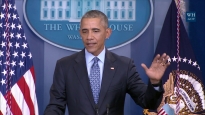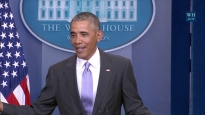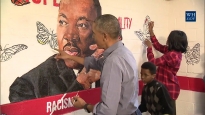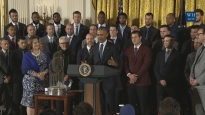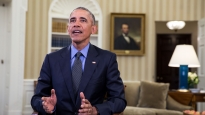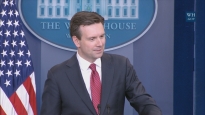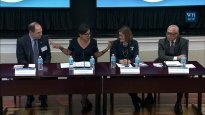President Obama Assesses BP Oil Spill Response
May 28, 2010 | 14:16 | Public Domain
The President speaks in Grande Isle, LA after assessing the response to the Deepwater BP Oil Spill and reaffirms the Administration’s commitment to doing all in its power to help protect the environment and the livelihoods of the population affected by the spill.
Remarks by the President After Briefing on BP Oil Spill
U.S. Coast Guard Station Grande Isle
Grande Isle, Louisiana
1:56 P.M. CDT
THE PRESIDENT: Good afternoon, everybody. I know it’s a little warm out here so want to get started. I’ve just had a meeting with these governors, members of Congress, local officials, as well as Admiral Thad Allen, the National Incident Commander in charge of response efforts to the BP oil spill. Admiral Allen gave us an update, the latest information on both the efforts to plug the well, as well as giving us an update on arrangements and coordination that's being made with respect to mitigating this damage that's been done.
He updated us on these latest efforts to stop the leak, mitigate the damage to the great beaches of the Gulf coast, and I had the chance to visit with -- Charlotte -- a beach like Port Fourchon that gives you a sense of what extraordinary efforts are being made at the local level, but also the damage that we're already starting to see as a consequence of this spill.
Now, our mission remains the same as it has since this disaster began, since the day I visited Louisiana nearly four weeks ago: We want to stop the leak; we want to contain and clean up the oil; and we want to help the people of this region return to their lives and their livelihoods as soon as possible.
And our response treats this event for what it is: It’s an assault on our shores, on our people, on the regional economy, and on communities like this one. This isn’t just a mess that we’ve got to mop up. People are watching their livelihoods wash up on the beach. Parents are worried about the implications for their children’s health. Every resident of this community has watched this nightmare threaten the dreams that they’ve worked so hard to build. And they want it made right, and they want to make it right now.
I just had a chance to listen to Mayor David Carmadelle of Grande Isle, our host here, telling us heartbreaking stories about fishermen who are trying to figure out where the next paycheck is going to come from, how are they going to pay a mortgage or a note on their boat. And he is having to dig into his pocket at this point to make sure that some of them are able to deal with the economic impact. So this is something that has to be dealt with immediately, not sometime later. And that’s everybody’s driving focus -- everybody who is standing behind me. This is our highest priority and it deserves a response that is equal to the task.
That’s why this has already been the largest cleanup effort in U.S. history. On the day this disaster began, even as we launched a search and rescue effort for workers on the drilling rig, we were already staging equipment in the event of a larger-scale spill. By the time we discovered the third breach, a week after the Deepwater Horizon platform sank, we had already stationed more than 70 vessels and hundreds of thousands of feet of protective boom on site.
Today, there are more than 20,000 people in the region working around the clock to contain and clean up this spill. We’ve activated about 1,400 members of the National Guard across four states. Nearly 1,400 vessels are aiding in the containment and cleanup effort. And we deployed more than 3 million feet of hard and sorbent boom, including an additional 100,000 just yesterday for these parishes in Louisiana that face the greatest threat.
Now, I’ve made clear to Admiral Allen and I did so again today that he should get whatever he needs to deal with this crisis. Whatever he needs, he will get.
Right now, we’re still within the window where we don’t yet know the outcome of the highly complex top kill procedure that the federal government authorized BP to use to try to stop the leak. If it is successful, it would obviously be welcome news. If it’s not, a team of some of the world’s top scientists, engineers and experts, led by our Energy Secretary and Nobel Prize-winning physicist Steven Chu, has for some time being -- has for some time been exploring any and all reasonable contingency plans.
But our response will continue with its full force regardless of the outcome of the top kill approach -- because even if the leak was stopped today it wouldn’t change the fact that these waters still contain oil from what is now the largest spill in American history. And more of it will come ashore.
To ensure that we’re fully prepared for that, and in accordance with input from folks down here, I’ve directed Secretary Napolitano and Admiral Allen to triple the manpower in places where oil has hit the shore or is within 24 hours of impact. This increase will allow us to further intensify this already historic response, contain and remove oil more quickly, and help minimize the time that any oil comes into contact with our coastline. That means deploying more boom, cleaning more beaches, performing more monitoring of wildlife and impact to this ecosystem.
We’re also going to continue to do whatever it takes to help Americans whose livelihoods have been upended by this spill. Gulf Coast residents should know that we’ve gathered all pertinent information regarding available assistance and the federal response in one place at whitehouse.gov.
We have ordered BP to pay economic injury claims, and we will make sure they deliver. And the parish presidents and governors here in Louisiana were already giving us some sense of some of the bureaucratic problems that we’re going to have to cut through, but we are going to cut through them. And for those who are in economic distress, if you’ve already filed a claim and you’re not satisfied with the resolution, then whitehouse.gov will point you in the right direction.
As I said yesterday, the Small Business Administration has stepped in to help businesses by approving loans, but also as important, allowing many to defer existing loan payments. A lot of folks are still loaded up with loans that they had from Katrina and other natural disasters down here, so they may need some additional help.
If you’re a small business owner and you weren’t aware of some of the programs that have been put in place or haven’t participated, then, again, the White House website will connect you to the resources you need. And we are making sure that all the parish presidents know, and folks like the mayor, other local officials are going to be aware of how they can get immediate help from us.
What’s more, we’ve stationed doctors and scientists across the five Gulf States to look out for people’s health and then to monitor any ill effects felt by cleanup workers and local residents. And we’ve begun setting up a system to track these efforts -- excuse me, to track these effects -- and ensure folks get the care that they need. And we’ve told BP that we expect them to pay for that, too.
As I’ve said before, BP is the responsible party for this disaster. What that means is they’re legally responsible for stopping the leak and they’re financially responsible for the enormous damage that they’ve created. And we’re going to hold them accountable, along with any other party responsible for the initial explosion and loss of life on that platform.
But as I said yesterday, and as I repeated in the meeting that we just left, I ultimately take responsibility for solving this crisis. I’m the President and the buck stops with me. So I give the people of this community and the entire Gulf my word that we’re going to hold ourselves accountable to do whatever it takes for as long as it takes to stop this catastrophe, to defend our natural resources, to repair the damage, and to keep this region on its feet. Justice will be done for those whose lives have been upended by this disaster, for the families of those whose lives have been lost -- that is a solemn pledge that I am making.
I think I can speak for anybody here, and for anybody who has been involved in the response and the cleanup effort, and for most Americans, when I say that I would gladly do whatever it takes to end this disaster today. But I want to also repeat something that I said to the group as a whole while we were meeting. This is a manmade catastrophe that’s still evolving and we face a long-term recovery and restoration effort.
America has never experienced an event like this before. And that means that as we respond to it, not every judgment we make is going to be right the first time out. Sometimes, there are going to be disagreements between experts, or between federal and state and local officials, or among state officials, or between states, about what the most effective measures will be.
Sometimes, there are going to be risks and unintended consequences associated with a particular mitigation strategy that we consider. In other words, there are going to be a lot of judgment calls involved here. There are not going to be silver bullets or a lot of perfect answers for some of the challenges that we face.
Understandably, the feelings of frustration and anger, the sense that any response is inadequate -- we expect that frustration and anger to continue until we actually solve this problem. But in the meantime, we’ve got to make sure that everybody is working in concert, that everybody is moving in the same direction. And I want everybody to know that everybody here -- at every level -- is working night and day to end this crisis. We’re considering every single idea out there, especially from folks who know these communities best.
Admiral Allen announced yesterday, for example, that, after a bunch of back-and-forth between state and federal experts, he is prepared to authorize moving forward with a portion of the idea for a barrier island that may stop some of the oil from coming ashore. We had an extensive conversation about this and -- to see whether additional steps can be taken on this barrier island idea.
And what I told the parish president, what I told the Governor, is that if there is an idea that can be shown to work, then we should move forward on it, and they deserve quick answers. But I also reminded everybody that we’ve got to make sure that whatever we do is actually going to work, particularly because we’re going to have not unlimited resources, at least not right now. For example, there’s a limited amount of boom. We’re going to try to get more boom manufactured. But that may take some time, and that means we’re going to have to make some decisions about how to deploy it effectively.
The bottom line is this: Every decision we make is based on a single criterion -– what’s going to best protect and make whole the people and the ecosystems of the Gulf.
And I want to thank everybody in this region who’s rolled up their sleeves and pitched in to help -– from the National Guard putting their experience to the task, to the local officials and every citizen who loves this area and calls it home, every American who’s traveled to the region to lend a hand. If any American is looking for ways to volunteer and help, then we’ve put links to that information on our website, as well -- that's whitehouse.gov.
And, all these governors -- Bobby Jindal, as well as Charlie Crist and Bob Riley, they want -- and I know Haley Barbour is not here but I think he agrees with this, as well -- one of the powerful ways that you can help the Gulf right now is to visit the communities and the beaches off of the coast. Except for three beaches here in Louisiana, all of the Gulf’s beaches at this moment are open, they are safe and they are clean. And so that's always a good way to help, is to come down and provide support to the communities along the coasts.
To the people of the Gulf Coast: I know that you’ve weathered your fair share of trials and tragedy. I know there have been times where you’ve wondered if you were being asked to face them alone. I am here to tell you that you’re not alone. You will not be abandoned. You will not be left behind. The cameras at some point may leave; the media may get tired of the story; but we will not. We are on your side and we will see this through. We’re going to keep at this every day until the leak has stopped, until this coastline is clean, and your communities are made whole again. That’s my promise to you. And that is a promise on behalf of a nation. It is one that we will keep.
And I will make one last point -- and I said this to every leader who is here: If something is not going right down here, then they need to talk to Thad Allen. And if they’re not getting satisfaction from Thad Allen, then they can talk to me. There’s nobody here who can’t get in touch with me directly if there is an idea, a suggestion, or a logjam that needs to be dealt with.
So we’re in this together. And it’s going to be a difficult time, and obviously the folks down here are going to be feeling the brunt of it, but we’re going to make sure that we’re doing everything we can to get this solved as quickly as possible.
And I want to again think everybody here for the extraordinary work that they’re putting in. You shouldn’t underestimate how hard these folks are working, day in, day out, on behalf of their constituencies.
So thank you very much. Thank you, everybody. (Applause.)
Q Mr. President, how confident are you that it will be -- that the leak will be plugged soon?
THE PRESIDENT: All I can say is that we’ve got the best minds working on it and we’re going to keep on at it until we get it plugged.
END
2:10 P.M. CDT
|
January 18, 2017
|
January 17, 2017
|
January 16, 2017
|
January 16, 2017
|
|
January 14, 2017
|
January 13, 2017
|
January 13, 2017
|
January 12, 2017
|
